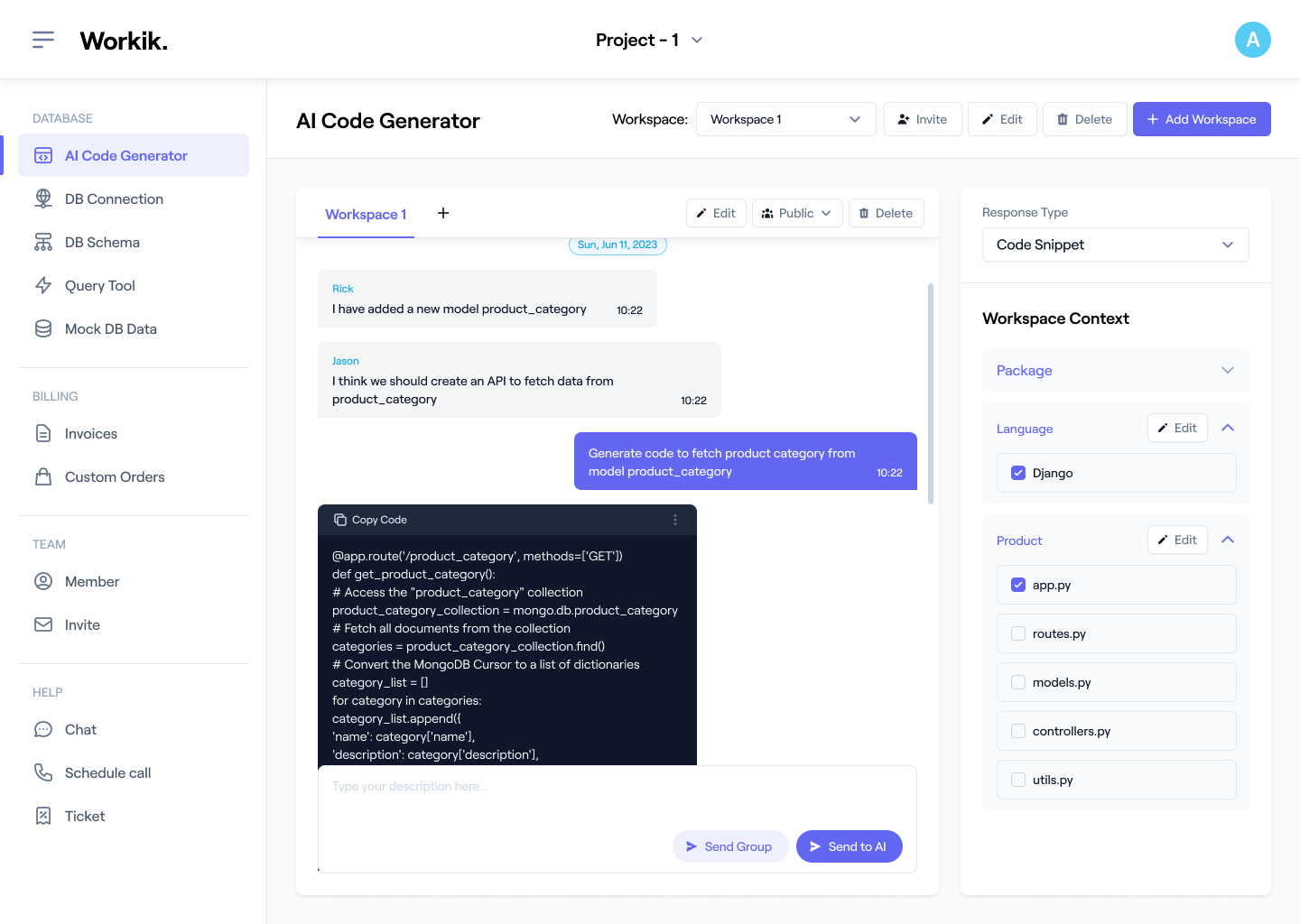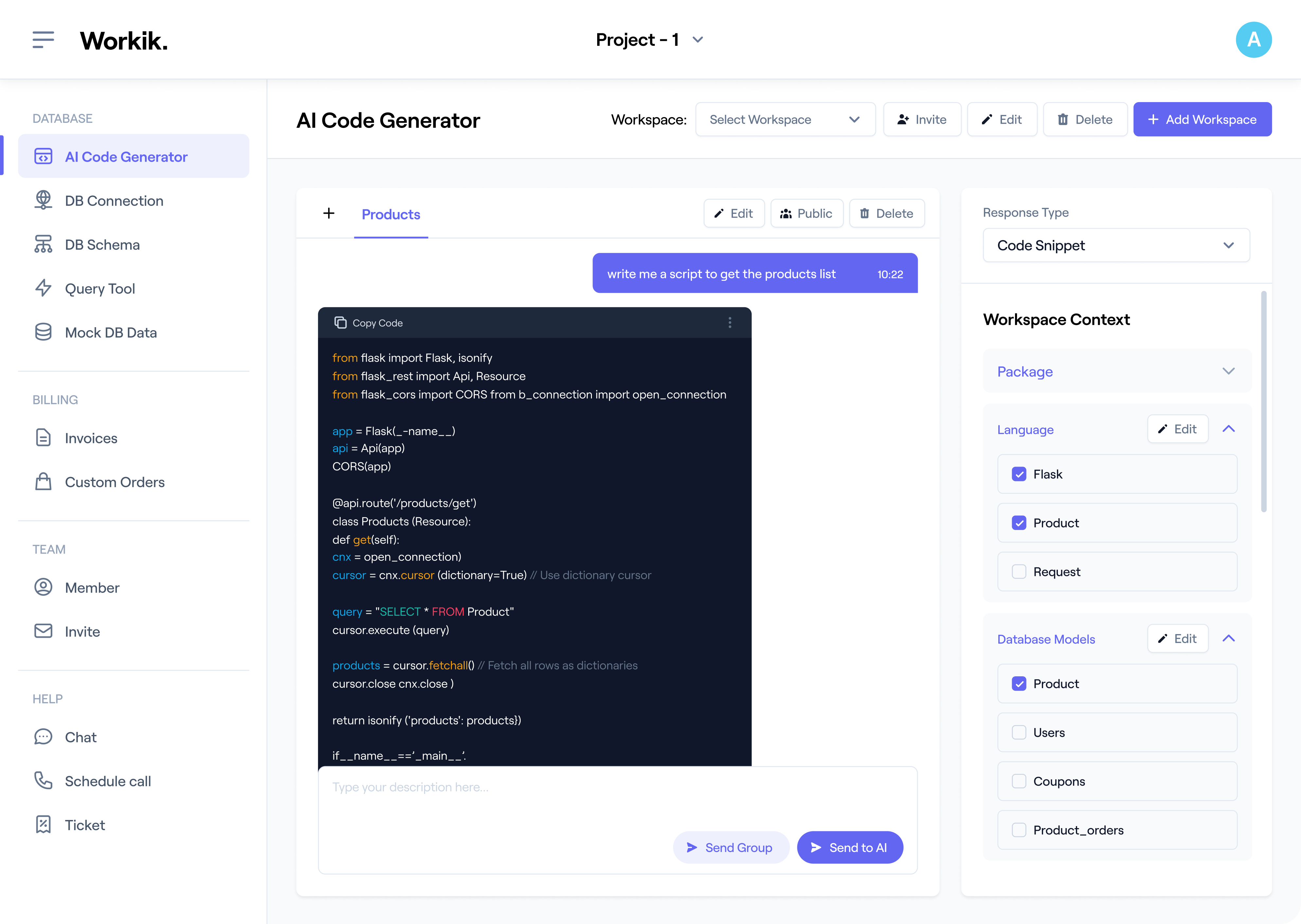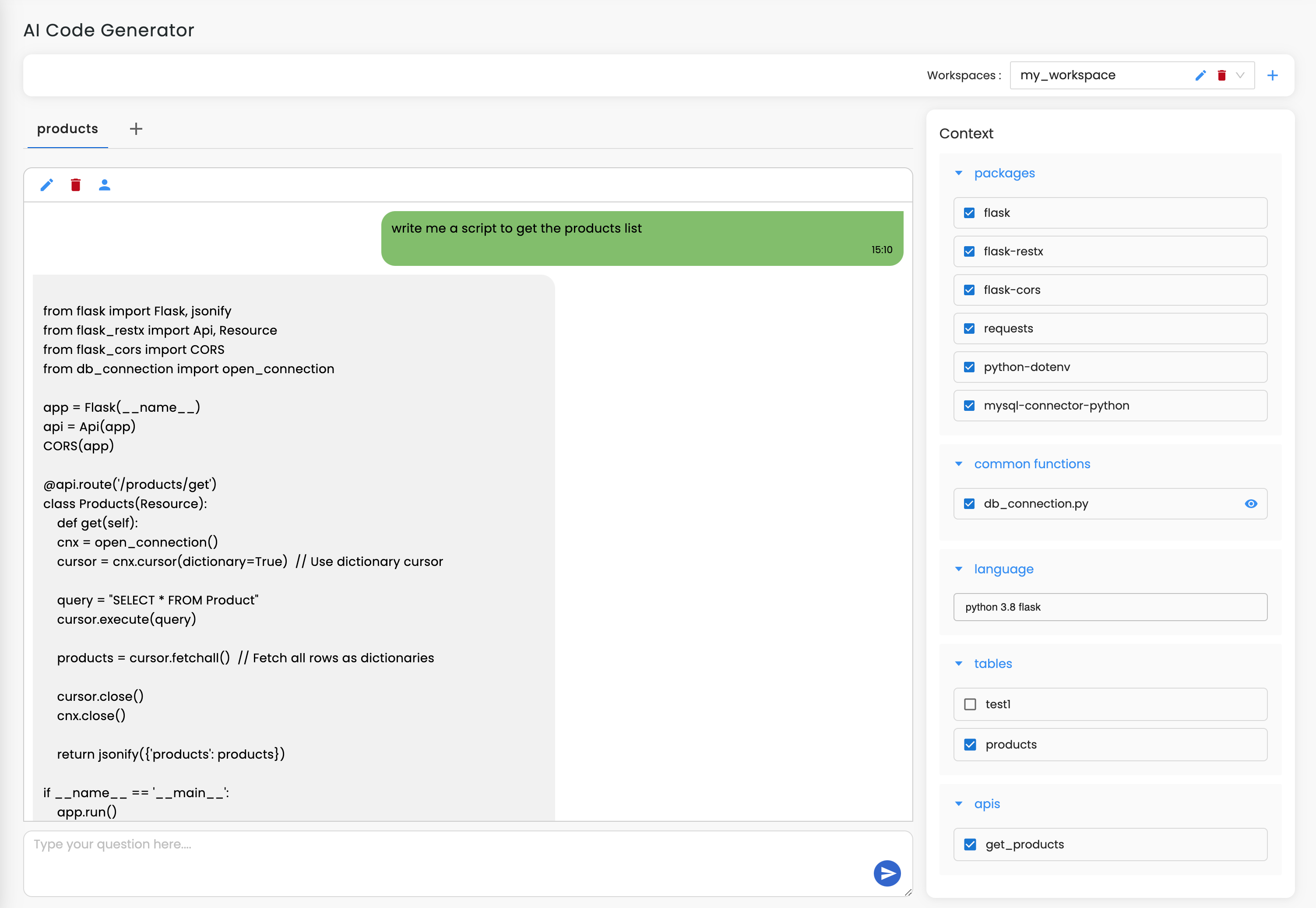
Join our community to see how developers are using Workik AI everyday.
Features

Accelerate Module Customizations
Use AI to generate Oracle EBS customizations with Oracle Forms and PL/SQL integrations for enhanced modules.

Generate Custom Reports
Leverage AI to craft Oracle BI Publisher reports with tailored layouts, queries, and formats aligned to ERP data structures.

Enhance SOA Integrations
AI simplifies integrations with custom API connectors, optimized data flows, and interoperability patterns.

Optimize ERP Workflows
AI seamlessly configures Oracle Workflow Builder with optimized triggers, precise steps, and actionable notifications.
How it works
Create your Workik account manually or sign in with Google to start developing Oracle ERP solutions with AI.
Import your Oracle ERP project from GitHub, GitLab, or Bitbucket. Define key components like modules, data structures, and workflows. Specify needs like data integration, reporting, automation, or security settings for tailored AI assistance.
Leverage AI to generate code, test, debug, and optimize Oracle ERP workflows. Apply best practices in integration, data flow, and performance.
Invite team members to collaborate in real-time within your workspace. Use AI for quality assurance, deployment readiness, and streamlined ERP launches, ensuring a smooth rollout.


Expand
.png)
.png)
Expand


Expand


Expand


Expand


Expand


Expand


TESTIMONIALS
Real Stories, Real Results with Workik
Workik’s AI transformed our Oracle ERP project workflows! From custom module creation to automated reports, it saves us hours every week.

Jane Mitchell
Senior Oracle Developer
With Workik, integrating complex Oracle EBS systems was a breeze. AI’s debugging tools let us focus on innovation, not troubleshooting.

Tom Chen
ERP Solutions Architect
Workik’s AI made Oracle ERP customization easy. The guided code suggestions and testing boosted my confidence and productivity!

Lisa Ray
Junior PL/SQL Developer
What are the popular use cases of Workik's AI for Oracle ERP code generator?


Some popular use cases of Workik's AI-powered Oracle ERP code generator for developers include, but are not limited to:
* Create custom modules with Oracle EBS and ADF for enterprise functionalities.
* Build complex PL/SQL scripts and stored procedures, optimized for reporting.
* Set up secure data integrations with Oracle SOA Suite, RESTful APIs, or third-party systems.
* Automate Oracle Workflow Builder configurations, including triggers, notifications, steps, and more.
* Configure BI Publisher and Oracle Forms for streamlined reporting and UI.
* Craft ERP data migration scripts for seamless legacy system integration.
* Generate role-based access control (RBAC) configurations.
What kind of context can I add in Workik AI related to Oracle ERP code generation?


Although setting context in Workik is optional, it improves AI-generated Oracle ERP code. Here are the types of context you can add:
* Programming language (e.g., PL/SQL, Java)
* Codebase files (import Oracle ERP projects from GitHub, GitLab, or Bitbucket)
* Libraries or extensions (e.g., Oracle Forms, Oracle Reports, Oracle BI Publisher)
* Frameworks (e.g., Oracle ADF, Oracle SOA Suite for integrations)
* API blueprints (e.g., Postman or Swagger for external integrations)
Can Workik AI assist in setting up Oracle ERP disaster recovery and backup procedures?


Yes, Workik AI can create SQL scripts for automated data backups, generate configurations for recovery points, and suggest optimal database replication methods to minimize data loss and ensure continuity in ERP applications.
How does Workik AI support Oracle ERP custom UI/UX enhancements?


Workik AI helps create customized user interfaces in Oracle ADF by generating code for personalized layouts, navigation, and UI components. For instance, AI can produce code snippets for responsive dashboards and role-specific interfaces, enhancing the user experience for employees.
Can Workik AI optimize Oracle ERP testing and QA processes?


Absolutely. Workik AI aids in generating unit and integration test scripts tailored for Oracle ERP modules. For example, in a financial ERP module, AI can create PL/SQL scripts to simulate transactional workflows, ensuring accuracy and performance before going live.
How does Workik AI handle Oracle ERP auditing and logging?


Workik AI can automate audit trail generation by producing code for detailed logging and activity tracking. For example, AI can set up audit triggers that log sensitive transactions and configuration changes in compliance-heavy sectors, such as healthcare or finance.
Can Workik AI streamline Oracle ERP training and onboarding?


Yes, Workik AI can generate tutorial scripts and interactive code samples for faster ERP onboarding. For example, in a new HR module deployment, AI can create sample workflows and code templates that illustrate key tasks, such as payroll processing or employee record updates.
Generate Code For Free

Oracle ERP: Question and Answer
Oracle ERP (Enterprise Resource Planning) is a suite of integrated applications that streamline core business functions such as finance, HR, supply chain, and project management. It enables organizations to automate processes, maintain accurate data, and ensure compliance. Oracle ERP is valued for its robust features in financial management, analytics, and process automation, and is widely used by enterprises to improve efficiency and decision-making.
Popular frameworks and libraries in Oracle ERP development include:
Application Development:
Oracle ADF (Application Development Framework), Oracle JDeveloper
Integration:
Oracle SOA Suite, Oracle Integration Cloud (OIC)
Reporting:
Oracle BI Publisher, Oracle Reports
Data Management:
Oracle PL/SQL, Oracle Data Integrator (ODI)
Automation and Workflow:
Oracle Workflow Builder
APIs:
Oracle REST Data Services (ORDS), Oracle E-Business Suite REST API
Security:
Oracle Identity Manager, Role-Based Access Control (RBAC)
Financial Management:
Manage accounts, budgets, and financial reporting with real-time accuracy.
Supply Chain Optimization:
Track and manage inventory, procurement, and logistics through integrated modules.
HR and Payroll Management:
Automate HR processes like recruitment, payroll, and employee self-service.
Data Integration and Migration:
Connect Oracle ERP with other databases or migrate legacy data to Oracle ERP.
Compliance and Audit Tracking:
Enable audit trails, reporting, and regulatory compliance in finance, healthcare, and others.
Career opportunities and technical roles for Oracle ERP professionals include Oracle ERP Developer, ERP Solutions Architect, Oracle EBS Consultant, Oracle Cloud ERP Specialist, Oracle ADF Developer, PL/SQL Developer, Oracle Integration Consultant, Workflow Automation Specialist, and ERP Data Migration Engineer.
Module Customization:
Create custom Oracle EBS or ADF modules with AI-driven code and schema suggestions.
Data Integration:
Generate integration scripts for Oracle SOA Suite, simplifying data flow.
Report Generation:
Automate custom Oracle BI Publisher reports with layouts and data mappings.
Workflow Automation:
Set up Oracle Workflow Builder automations with triggers and task sequences.
Performance Optimization:
Improve ERP performance with indexing, caching, and query optimizations.
Testing and Debugging:
Set up automated tests and debugging scripts for PL/SQL and ERP workflows.
Explore more on Workik
Get in touch
Don't miss any updates of our product.
© Workik Inc. 2026 All rights reserved.

